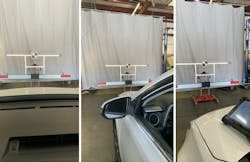ADAS work isn’t very common among independent automotive repair shops right now. In fact, less than 1 in 5 shops are equipped to do it, according to Ratchet+Wrench’s Industry Survey. However, it seems to be catching on as warranties wear off on vehicles with these systems and shops are realizing what a valuable profit center it can be. Forty percent said that they plan on investing in the next five years.
King’s Auto Service in Raleigh, N.C., is an example of a shop that’s investing early in anticipation of it becoming a profit center in the future. The shop has invested $36,000 to date and will continue to invest when targets come out for newer models. Although the shop does not see much work coming in yet, it’s anticipating that, in the near future, it will pay off to have invested early, with an influx of vehicles needing ADAS work coming in.
With so little work coming in and not many options available for education, it would be easy to let ADAS training fall by the wayside. Rather than let this happen, the staff at King’s Auto Service is creating valuable connections and looking for resources now so that when a difficult ADAS job comes in, the shop is ready.
THE BACKSTORY
King’s Auto Service in Raleigh, N.C., opened in 1946. Daniel Williams, currently the shop foreman, came to work at the company 22 years ago when he graduated from high school.
For a little over a year, King’s Auto Service debated whether or not to take the plunge into doing ADAS work and 7 months ago decided to go all in and purchase equipment that would allow them to do calibrations, scanning and diagnostics. To date, the shop has invested $36,000 in ADAS. It’s a large investment, but the investment was made due to the large number of cars that will be coming in the future that will need this type of work, Williams says, which makes it a future profit center.
Currently, the shop focuses on camera calibrations with a few radar calibrations sent over from collision shops. Williams estimates that 90 percent of the ADAS work is sent over from glass companies whose customers need new windshields installed and collision shops.
THE PROBLEM
Williams, along with one other member of the King’s team, perform all of the ADAS jobs that come in. Since there’s not a lot of work yet, it wasn’t essential to have too many people trained on it. Ninety-nine percent of the jobs that come in are “relatively smooth,” Williams says, which is good, since Williams did his own research to figure out how to do everything.
“Other than the hour the Autel rep was with us going over some stuff, training has really been on my own—just gettin in there and doing it,” Williams says.
Although he’s been able to do the work, Williams worries about jobs that he may not be able to solve and began looking for support and training nearby.
THE SOLUTION
Being in Raleigh, King’s is located near the Carquest Technical Institute (CTI) and has had a good relationship with Advance for years.
“That’s where we do most of our bi-monthly training on automotive maintenance and new technology,” Williams says. “We always try to ask questions of them and build a good relationship. Whenever we have a problem, we call and ask and, if they’re able, they swing by.”
It occurred to the King’s team to use this resource for any questions that they have with ADAS work. After owner Dean Bailey made the investment, he told the CTI research and development team, including its research and development center manager, Randy Briggs. With such a valuable resource down the road, the shop decided to take advantage of that relationship and get support for their new venture into ADAS work.
“We always offer up the opportunity to reach out if they have any questions,” Briggs says. “From time to time, they’ll reach out if a problem-child vehicle comes in.”
Advance is offering training courses for ADAS, but the team at King’s has not attended a formal session yet, but may take advantage in the future when the coronavirus clears up or they find a need for more formal training. Right now, with the limited work that’s coming in and the ability to be able to call Briggs—or Autel support—directly, there hasn’t been a need.
Once every other week we call and discuss ADAS,” Williams says of his relationship with the CTI team. “If I run into something interesting, I’ll call and let them know.”
Doing this has helped Advance and its curriculum development. By getting feedback and what shop owners are running into, it has been able to adjust its teachings to be able to address common issues. This is a mutualism relationship, with both King’s and Advance, benefitting from working together.
For those that are not close to such a valuable resource, finding training is key. There are plenty of resources online, including CTI’s website (CTIonline.com) as well as ADAS Facebook groups, says Briggs. If you’ve invested in the equipment, reach out to the provider, as the company can often provide support. Briggs adds that, in order for training to be successful, it’s up to the participant to become a self-learner.
“You need to get up to speed. If you walk into a four-hour class and all you can do is spell ADAS, you won’t get a lot out of it. Take responsibility for your own learning,” Briggs says.
THE AFTERMATH
Just a few months in, Bailey says that the ROI on ADAS has been very little, but that he expects it to increase as glass companies and smaller collision repair shops begin to understand the need for calibrations. Williams says he expects it will take roughly three years for a full ROI.
The shop expected a low car count for this type of service at first, but it wanted to stay ahead and make sure it had the support available if a problematic vehicle ever came in—which is why Williams is in contact with Briggs at CTI. Rather than wait until there’s an influx of vehicles and work that he’s not sure how to perform, he took a proactive approach.
THE TAKEAWAY
As a relatively new profit center for King’s, there hasn’t been much ADAS training needed, but the team will
continue to evaluate the need for it. Right now, King’s is relying on the existing relationships that it has with CTI and Autel, which provides technical support whenever needed and is able to go right into the scan tools that King’s uses and see exactly what the team is looking at. By doing this, they can see if anything is set up incorrectly.
“We lean on the company that we’ve invested money into,” Williams says.
By taking advantage of a preexisting relationship and leaning on vendors, King’s has been able to get the support and assistance it needs for its latest venture.

